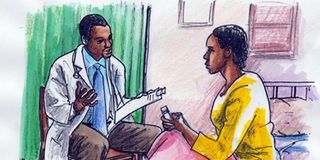The calling of a health worker

It was very sad for a medical doctor to be called a consummate liar, especially by a High Court judge. It is equally disheartening when a doctor is hauled and arraigned in a court of law like a chicken thief on a criminal offence. No wonder the Medical and Dental Practitioners Council will suspend or de-register a doctor who is convicted in a court of law.
Medicine is a noble profession and healthcare providers, more so doctors, are therefore expected to exhibit behaviours that conform to the profession. It is stated that being a doctor is first a vocation (a calling), and then a profession. The doctor must master his science in order to diagnose the illness of his or her patient and offer the appropriate remedy. The patient must be given the correct and up-to-date medical management and in the right milieu (environment). But the interaction of a doctor with a patient calls for far more than the scientific knowledge and the practice of medical ethics. It calls for qualities that if possessed and practised by the healthcare provider, will ensure that patients are secure in their trust and confidence.
Doctors must be truthful at all times. This is the virtue of veracity. Doctors must not deliberately lie to their patients, colleagues and the community at large. Least of all, doctors must not lie in a court of law.
However, they must also exercise wisdom and discernment when circumstances so demand. There are circumstances when the truth may be too painful for a patient to confront at a particular time and counselling is required. However, there is no room for benevolent deception in medicine. Healthcare providers should know the difference between obfuscation and compassionate provision of information. One of the few dilemmas that confront truthfulness is when there is no one best or correct solution to a problem.
And it is not enough that health workers must be truthful but must be courageous enough to stand for the truth no matter what. Sometimes it calls for courage to act in the best interest of the patient and say no to temptations that may arise in the line of duty. It takes courage to uphold medical ethics.
Health workers need to earn the confidence of their patients in order for the patients to disclose all the relevant personal information for them to provide appropriate diagnosis. Health workers must respect the privacy of patients and observe the highest degree of confidentiality. It is for these reasons that patients trust their doctors.
However, there may be legal obligations when confidentiality may be breached, for instance, when the public interest overrides in particular circumstances. Nevertheless, every effort must be taken to protect the patient’s information and identity.
Integrity is a quality that is a must for healthcare providers. This is what makes them reliable, dependable and trustworthy. Integrity makes a healthcare provider stick to their duty no matter what. This is the virtue that governs the doctor-patient relationship. Integrity will distinguish between self interest, patient interest and conflict of interest. Integrity is what will uphold the ethical principles of patient management. Another name for integrity is being up “righteous”.
It is as simple as that.
Compassion for the patient means empathy, perceptivity and sensitivity to the needs of the patient. It also means kindness and humaneness and feeling for the patient. It is the quality that helps separate the giving of medical care from mere application of science. Compassion is what will drive a health worker beyond the hours of duty. It is the true call of duty. The opposite of this is rudeness and insensitivity, ills that will alienate the patient and have negative impact on the doctor-patient relationship.
A virtuous health worker must be able to read between the lines and be able to discern the real needs of the patient and the social aspects of the presentation. A healthcare provider’s judgment must be spot on. They need to know the difference between knowledge and wisdom; knowledge is got from information (science) and it tells the healthcare provider what can be done, while wisdom is obtained through experience and tells the healthcare provider what ought and ought not be done.
Health workers must respect their colleagues and value team work. The medical arena is wide and with specialisation and super-specialisation, shared responsibility will always be in the best interest of the patient. Part of team work and team building is the commitment to pass on professional knowledge and skills to colleagues and a willingness to learn from each other. This will also help a health worker self-reflect, self-regulate and audit one’s professionalism.




